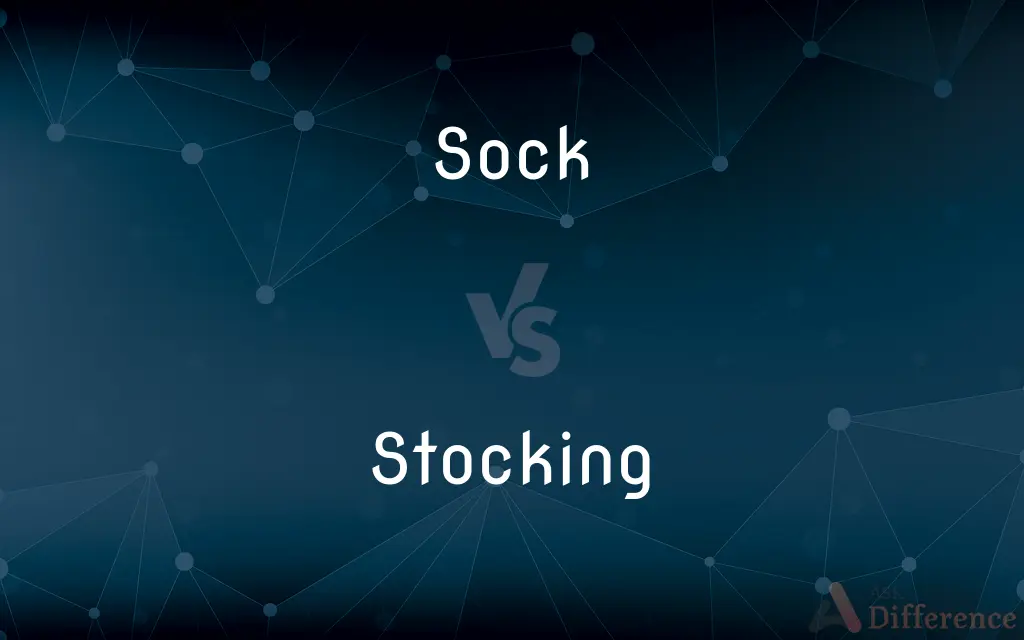Sock vs. Stocking — What's the Difference?
By Tayyaba Rehman — Updated on September 26, 2023
A sock is a piece of clothing worn on the feet, typically covering the ankle or some part of the calf. A stocking is also a close-fitting, elastic garment that usually covers the foot and the leg up to the knee or thigh, often thinner and more delicate.

Difference Between Sock and Stocking
Table of Contents
ADVERTISEMENT
Key Differences
A sock and a stocking, while similar in purpose, differ significantly in length, thickness, material, and usage. A sock is a short, thick piece of clothing typically made from cotton or wool, designed to absorb sweat and provide warmth and protection to the foot. It usually covers the foot and a portion of the ankle or calf, making it suitable for daily wear with shoes. In contrast, a stocking is a long, thin garment, usually made of nylon or silk, covering the foot and extending up the leg, often up to the knee or thigh, commonly worn by women as a fashion accessory or for added warmth.
The design and construction of a sock are generally simpler and more durable, tailored to withstand everyday wear and tear. It is versatile, catering to a range of activities, including sports, casual outings, and formal occasions. It often features a ribbed cuff at the opening to secure it around the ankle or calf. Conversely, a stocking is more intricate and delicate, often featuring decorative patterns and designs, and may require garters to hold them up. It is predominantly associated with elegance and formal attire, complementing skirts and dresses.
When considering the material and texture, socks are usually thicker and cozier, providing cushioning and comfort to the feet. They are designed to be practical, offering protection and reducing friction between the foot and the shoe. Stockings, on the other hand, are typically thinner and sheer, adding a layer of elegance without offering much warmth or cushioning. They serve more of a decorative or aesthetic purpose, enhancing the appearance of the legs.
In terms of usage and versatility, socks are universal and unisex, worn by individuals of all ages and genders. They come in a plethora of colors, patterns, and lengths, suitable for various occasions and weather conditions. Stockings are primarily worn by women, often chosen as a fashionable accessory to formal and semi-formal attire. They are available in different colors, opacities, and textures, allowing for style versatility and personal preference.
In conclusion, while socks and stockings serve the basic purpose of covering the foot, they diverge in terms of length, material, design, and usage. Socks are shorter, thicker, and more durable, designed for everyday comfort and practicality, whereas stockings are longer, thinner, and more decorative, typically worn for style and elegance.
ADVERTISEMENT
Comparison Chart
Length
Covers the foot and part of the calf or ankle
Covers the foot and extends up the leg to the knee or thigh
Material
Thicker, often made from cotton or wool
Thinner, usually made from nylon or silk
Purpose
Practical, for warmth and protection
Decorative, typically for style and elegance
Usage
Universal, worn by all genders and ages
Predominantly worn by women
Design
Simpler, more durable with a ribbed cuff
More intricate, often with decorative patterns, may require garters
Compare with Definitions
Sock
A short, thick garment for the foot.
She pulled on a warm, woolly sock to stave off the cold.
Stocking
A long, thin garment covering the foot and leg.
She wore a silk stocking to complement her evening dress.
Sock
Typically made from cotton or wool, designed for comfort.
He always chooses a breathable cotton sock when going for a run.
Stocking
Extends up the leg to the knee or thigh.
She chose a thigh-high stocking to wear with her short skirt.
Sock
Designed to absorb sweat and provide warmth.
He opted for a thermal sock for the winter hike.
Stocking
Often decorative and worn for style and elegance.
The patterned stocking made a stylish statement.
Sock
A sock is a piece of clothing worn on the feet and often covering the ankle or some part of the calf. Some type of shoe or boot is typically worn over socks.
Stocking
Typically made of sheer materials like nylon or silk.
The delicate, sheer stocking added an elegant touch to her attire.
Sock
A garment that covers the foot and part of the leg usually made of cotton or wool and worn for warmth or for protection from abrasion from a shoe or boot.
Stocking
May feature different colors, textures, and opacities.
She wore a black, opaque stocking for the formal event.
Sock
(Meteorology) A windsock.
Stocking
Stockings (also known as hose, especially in a historical context) are close-fitting, variously elastic garments covering the leg from the foot up to the knee or possibly part or all of the thigh. Stockings vary in color, design, and transparency.
Sock
A light shoe worn by comic actors in ancient Greek and Roman plays.
Stocking
A close-fitting, usually knitted covering for the foot and leg, often made of sheer fabric as nylon or silk and rising high on the leg.
Sock
Comic drama; comedy
"He ... knew all niceties of the sock and buskin" (Byron).
Stocking
A sock.
Sock
A hard blow or punch.
Stocking
An elasticized garment that exerts pressure on the leg to improve blood flow and is used in the treatment of various circulatory disorders or sometimes following surgery.
Sock
To provide with socks.
Stocking
A bag in the shape of a large sock that is often decorated and hung on a mantle for the deposit of Christmas presents.
Sock
To hit or strike forcefully; punch.
Stocking
A white marking on the lower leg of a dark-colored horse, extending from the hoof to at least the hock or knee.
Sock
To deliver a blow.
Stocking
A soft garment, usually knit or woven, worn on the foot and lower leg under shoes or other footwear.
A pair of stockings
Sock
A knitted or woven covering for the foot.
Stocking
A broad ring of a different fur colour on the lower part of the leg of a quadruped.
Sock
A shoe worn by Greco-Roman comedy actors.
Stocking
A knitted hood of cotton thread which is eventually converted by a special process into an incandescent mantle for gas lighting.
Sock
A cat's or dog's lower leg that is a different color (usually white) from the color pattern on the rest of the animal.
Stocking
(forestry) A ratio of the actual density of trees in an area to the ideal density that would make the fullest use of the land.
Sock
(Internet slang) A sock puppet.
Stocking
Present participle of stock
I've almost finished stocking these groceries.
Sock
Ellipsis of windsock.
Stocking
A close-fitting covering for the foot and leg, usually knit or woven.
Sock
Ellipsis of gun sock.
Stocking
Any of various things resembling, or likened to, a stocking{1};
Sock
(slang) A violent blow; a punch.
Stocking
To dress in GBs.
Sock
A ploughshare.
Stocking
Close-fitting hosiery to cover the foot and leg; come in matched pairs (usually used in the plural)
Sock
Abbreviation of socket
Stocking
The activity of supplying a stock of something;
He supervised the stocking of the stream with trout
Sock
The sound of a punch or powerful blow.
Stocking
Wearing stockings;
Walks about in his stockinged (or stocking) feet
Sock
To hit or strike violently; to deliver a blow to.
Sock
To throw.
Sock
Extremely successful.
Sock
A plowshare.
Sock
The shoe worn by actors of comedy in ancient Greece and Rome, - used as a symbol of comedy, or of the comic drama, as distinguished from tragedy, which is symbolized by the buskin.
Great Fletcher never treads in buskin here,Nor greater Jonson dares in socks appear.
Sock
A knit or woven covering for the foot and lower leg; a stocking with a short leg.
Sock
A warm inner sole for a shoe.
Sock
To hurl, drive, or strike violently; - often with it as an object.
Sock
Hosiery consisting of a cloth covering for the foot; worn inside the shoe; reaches to between the ankle and the knee
Sock
A truncated cloth cone mounted on a mast; used (e.g., at airports) to show the direction of the wind
Sock
Hit hard
Sock
Covers the foot and part of the calf or ankle.
She wore a knee-high sock to match her skirt.
Sock
Comes in various lengths, colors, and patterns.
She picked a colorful, striped sock to brighten her outfit.
Common Curiosities
Are socks typically shorter than stockings?
Yes, socks are generally shorter, often covering just the foot and ankle, while stockings extend up the leg.
Do socks come in different materials like cotton and wool?
Yes, socks are available in a variety of materials, including cotton, wool, and synthetic fibers, each offering different levels of warmth and comfort.
Are stockings usually thinner than socks?
Yes, stockings are typically thinner and made of sheer materials like nylon or silk.
Can stockings have decorative patterns and designs?
Yes, stockings often feature intricate patterns and designs, adding to their decorative and aesthetic appeal.
Are socks generally more durable than stockings?
Yes, socks are designed to be more durable and practical, suited to everyday wear and various activities.
Can socks be worn by all genders and ages?
Yes, socks are universal and can be worn by individuals of all genders and ages.
Are stockings primarily a fashion accessory for women?
Yes, stockings are predominantly worn by women, often as a fashionable accessory to formal attire.
Can stockings require garters to hold them up?
Yes, some stockings may require garters to hold them up, especially those that extend up to the thigh.
Are socks primarily designed for comfort and warmth?
Yes, socks are designed to provide warmth, comfort, and protection to the feet.
Do stockings come in different opacities?
Yes, stockings are available in different opacities, from sheer to opaque, allowing for varied style preferences.
Can socks have a ribbed cuff at the opening?
Yes, many socks feature a ribbed cuff at the opening to help secure them around the ankle or calf.
Share Your Discovery

Previous Comparison
Peace vs. Solace
Next Comparison
Favorable vs. FavourableAuthor Spotlight
Written by
Tayyaba RehmanTayyaba Rehman is a distinguished writer, currently serving as a primary contributor to askdifference.com. As a researcher in semantics and etymology, Tayyaba's passion for the complexity of languages and their distinctions has found a perfect home on the platform. Tayyaba delves into the intricacies of language, distinguishing between commonly confused words and phrases, thereby providing clarity for readers worldwide.












































